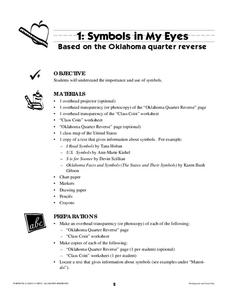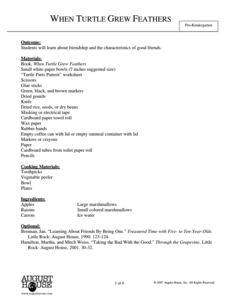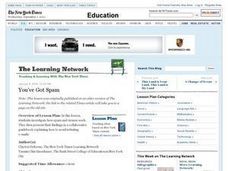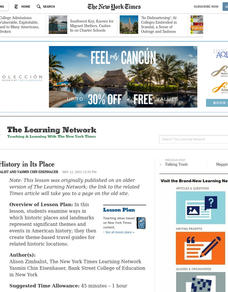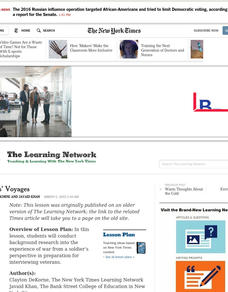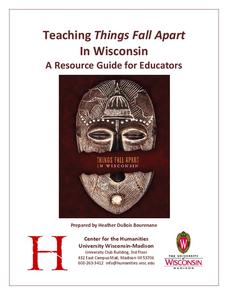EngageNY
Analyzing the Main Idea in Video: Understanding the Limbic System
It's time to put on those thinking caps and analyze the brain! Pupils watch a video about teenage brain development, using a note-catcher to capture their thoughts about the main idea. Finally, they select two pieces of information from...
Facing History and Ourselves
Defining Democracy
For democracies, it is both the best and the worst of times. As part of a study of the challenges facing democracies, young political scientists seek first to define democracy, and then to consider the relationship between democracy and...
US Mint
Symbols in My Eyes
Explore the hidden meanings behind the images on US currency with this elementary school lesson on symbolism. Starting with a class discussion about symbols, children go on to brainstorm different objects that represent the Unites States...
Smithsonian Institution
Be a Food Detective
What are packaged food products really made of? This lesson plan will prompt your learners to consider and investigate the source of ingredients in their food. They begin by breaking into groups and analyzing food labels by identifying...
Visa
Allowances and Spending Plans
Help youngsters understand how to manage small amounts of money by discussing an allowance and the difference between spending, saving, and giving.
Houghton Mifflin Harcourt
Family and Friends: Extra Support Lessons (Theme 4)
Family and Friends is the theme of a unit offering extra support lessons. Follow each lesson plan's teach, blend, guided practice or practice/apply routine to reinforce concepts such as clusters, responding to reading, drawing...
August House
When Turtle Grew Feathers
Friendship is a valuable part of growing up. Learn about the importance of friendship with a variety of activities based on When Turtle Grew Feathers by Tim Tingle. Kids practice making musical instruments, discussing plot points,...
Illustrative Mathematics
Tossing Cylinders
Everyone loves a lesson that involves throwing things around! To understand probability, your experimenters will predict how different cylinder-shaped objects will land when tossed. When the data is collected, they will calculate the...
EngageNY
Grade 9 ELA Module 1: Unit 3, Lesson 18
Why is Romeo and Juliet considered a tragedy? Class members conclude their reading of the play, focusing on the final lines of Act 5, scene 3. They also consider how Shakespeare structures the text, orders events, and manipulates time to...
PBS
Impact Craters on Earth
What does it look like when a meteorite strikes Earth? A slideshow resource gives pupils a firsthand view of common meteorite strikes. Using the ages of the craters, scholars analyze how the shapes erode over time.
Council for Economic Education
Great Civilizations Develop around Rivers
If you lived in prehistoric times, what kinds of choices could your family make to increase their chance of survival? By making similar decisions in a simulation game, participants discover how specialization creates both opportunity and...
Council for Economic Education
Entrepreneurs in Mesopotamia
While ancient Mesopotamia didn't have the TV show "Shark Tank," it was a time of entrepreneurship as workers began to specialize. Both individual workers and the societal structure encouraged individuals to consider how they could...
Novelinks
The House on Mango Street: List-Group-Label
Encourage close reading of the text and a focus on how Sandra Cisneros' develops her characters with an activity that asks teams to sort, group, and label character descriptions from The House on Mango Street.
Curated OER
What is Terrorism?
Spark what's sure to be an interesting discussion in your classroom by introducing the topic of terrorism. Consider the meaning of the word terrorism and examine the associated connotations with a brief introductory reading. With your...
Ed Change
Facilitating the Difficult Dialogue: Role Plays
Students share stories and role play about a time when they participated in, or facilitated, a discussion on racism, sexism, classism, heterosexism, or another form of oppression that took an unexpected turn and caused conflict that was...
Curated OER
More of, Less of
Have your class discuss behaviors they like from other people. They will then get into groups and list behaviors they want to see more of from people in their community, classroom, or school. This is a great Character Counts lesson!
Curated OER
A Duck's Bill on Capitol Hill?
Use a list of environmentally related words to engage learners in a discussion about ecosystem conservation legislation. As a class, read "Aware of Political Ecosystem, Property Rights Advocate Embraces Conservation Plan." Then, present...
Curated OER
You've Got Spam
What is spam mail? Discuss examples of spam mail and read about the "Can Spam Act." After reading the New York Times article attached, brainstorm why the act hasn't had much impact yet. Several discussion questions are listed.
Curated OER
Putting History in its Place
Examine ways in which historic places and landmarks represent significant themes and events in American history. Then create theme-based travel guides for related historic locations. This lesson plan requires informational reference...
Curated OER
Gaining Perspective
Discuss race in the United States. Start by having each learner read a copy of Martin Luther King Jr's famous speech, "I Have a Dream." Then, have them read the article "Shared Prayers, Mixed Blessings" about a church in Atlanta,...
Curated OER
Veterans' Voyages
Introduce your middle and high schoolers to a different perspective on war: that of soldier's. Read Guisseppi Ungaretti's poem "Vigil" to kick-start this activity. After discussing his perspective, read "The Screaming Eagles Fly to the...
Curated OER
The Many "I's" In "Team"
Pupils examine the negative behavior of an Olympic athlete. They look at how his choices affected the team as well as his position on the team. They consider the many reasons why unity is important among the members of an organization...
Curated OER
Double Jeopardy Clause: A Fifth Amendment Constitution Trivia Game
Here is a wonderful way to introduce your learners to the Fifth Amendment of the Bill of Rights. There are 16 questions designed to generate thinking and discussion questions about the Fifth Amendment. This instructional activity is...
University of Wisconsin
Teaching Things Fall Apart in Wisconsin: A Resource Guide for Educators
“There is no story that is not true, . . .” And uncovering the truths in Things Fall Apart is the focus of a 68-page resource packet designed to provide instructors with a wealth of materials that enhance understanding of Chinua Achebe’s...




